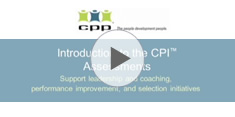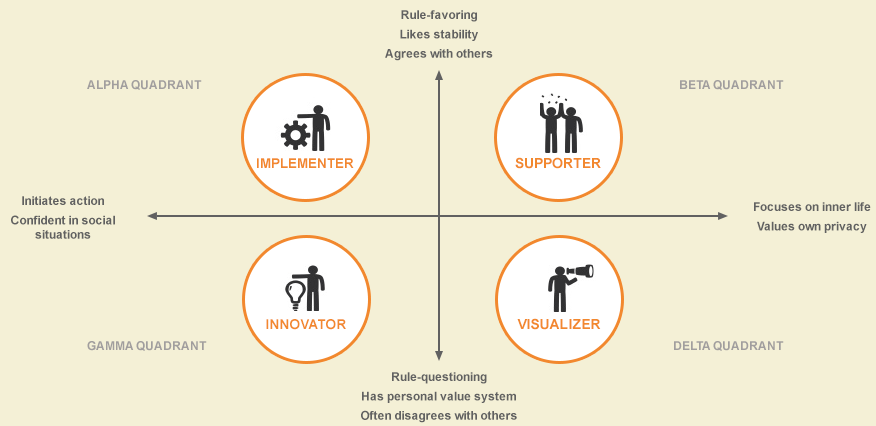
 California Psychological Inventory™ (CPI™) California Psychological Inventory™ (CPI™)

Meet the CPI
Featured Products

Give your clients the insights they need to become more successful leaders. More »

Explore your client's unique professional and personal styles. More »

Provides comprehensive information needed to understand the CPI 260® tool. More »
Next
Quick Facts
- Complements your leadership development, performance improvement, succession planning, and selection programs.
- Has exceptional reliability and validity with a normative sample of 6,000 individuals.
- Provides tools for either one-on-one or group coaching (CPI 260).
California Psychological Inventory™ (CPI™)
The California Psychological Inventory™ (CPI™) assessments are powerful tools for helping individuals improve their performance and enabling organizations to find and develop high-potential employees and leaders and cultivate a rich pool of talent for building organizational success.
The CPI instruments help people gain a clearer picture of their personal and work-related characteristics, motivations, and thinking styles—as well as how they manage themselves and deal with others—and provide a view into their strengths and developmental opportunities.
The CPI model helps individuals discover their orientations toward people and interpersonal experience, toward rules and values, and toward their inner feelings. Participants’ results in these areas indicate which of four different ways of living, or lifestyles, best describe them and provide insights about how they see themselves and how they are seen by others.

Explore the CPI Model
Hover over the graphics below for descriptions of the four lifestyles.

Why They're Popular
The CPI instruments are trusted tools because they:
- Provide a portrait of both personal and work-related characteristics
- Develop leadership abilities by helping individuals better understand themselves and how they interact with others
- Help organizations identify talent by measuring results relating to occupational issues, creativity, leadership, amicability, and tough-mindedness
- Offer real-life applications and practical insights for training, development, and coaching by presenting suggested next steps (CPI 260)
- Are backed by excellent support and guidance through CPP’s global distributor network
-
“The CPI 260 (tool) provides an efficient and effective approach to identify very specific areas of development for our managers.”
Monty Morton, Director of Training & Development, Human Resources
J.B. Hunt Transport Service, Inc
-
“I’m impressed with the breadth of what it measures—from dealing with others and self-management to motivations and thinking styles.”
Greg Beam, Director of Partner Learning & Development
H-E-B Grocery Company
-
"CPI 260 is an excellent tool for providing the foundation to build a coaching relationship based on empirical data. For executives and aspiring leaders, the tool provides a lens to develop leaders who can: aspire to challenge the process of leadership, create visionary leadership, enable others to act, modeling leadership and encouraging the heart.”
Hollis M. Pierce, Educational Consultant and Leadership Coach
Advanced Strategies for Professional Development
Next
How They Help
The CPI assessment is ideal for a wide range of applications, including:
- Leadership development—help individuals and organizations identify leadership strengths and developmental opportunities
- Performance improvement—increase leaders’ self-awareness and help them adjust their behavior
- Succession planning—build leaders at all levels and strengthen the organization
- Selection and retention—help organizations find the right talent and keep them engaged
- Executive coaching—can be used to create developmental plans that empower leaders to reach their full potential
Featured Case Studies
-
Leadership and Team Development Solution Improves Hurricane Preparedness: A Case Study of AIM Investment Services
Learn more »

Assessments Are an Essential Part of The Delta Associates' Executive Coaching and Consulting
Learn more »

CPI™ Assessments Enable Transportation Company to Identify Sales Hires with High Potential: Two Profiles for Two Types of Positions Help Predict Productivity and Job Satisfaction
Learn more »
Next
CPI Brand Portfolio
While two versions of the CPI instrument are currently available, they both provide a flexible framework to create solutions across all areas of professional and personal development.
CPI 260® Key Highlights
- Contains 260 items selected from the full 434-item assessment for more streamlined administration
- Measures responses on scales covering dealing with others, self-management, motivations and thinking style, personal characteristics, and work-related characteristics
- Offers practical, down-to-earth insights for OD, coaching, and HR professionals in a business or organizational context
- Is more business focused and generates leadership development reports that can function as developmental plans and coaching aids
- Generates two reports: Client Feedback Report and Coaching Report for Leaders
CPI™ 434 Key Highlights
- Contains 434 items
- Measures responses on scales covering social expertise and interpersonal style, maturity, achievement orientation, creative temperament, managerial potential, tough-mindedness, and more
- Is designed for professionals who are qualified to use complex assessment tools and have a solid background in personality theory and assessment methodology, as well as experience in the analysis of individual test data
- Generates three reports: Profile, Narrative Report, and Configural Analysis Report

Get Started
There are two routes to eligibility:
- CPI 260® Certification Program
The CPI 260® Certification Program prepares participants to purchase and use the CPI 260 assessment. The two-and-a-half day workshop is highly interactive and provides many opportunities to practice presenting the CPI 260 tool and interpreting results. Learn more about becoming a CPI 260® Certified Practitioner.
- On-Site CPI 260® Certification Program
CPP offers on-site training delivery to groups of five people or more. The CPI 260® Certification Program teaches participants how to professionally and ethically use the CPI 260 assessment and provides them with the greatest level of expertise. Learn More »
- Educational Eligibility
Many professionals and practitioners are able to purchase the CPI 260 and 434 tools right away by verifying their educational and/or professional license eligibility. If you hold a master’s or doctoral degree in psychology or a related field and/or hold a specific state license or national or state certification, you are considered educationally eligible. If you hold the appropriate credentials, applying for eligibility is as simple as completing a brief form. Learn more about Educational Eligibility Requirements.
|
|